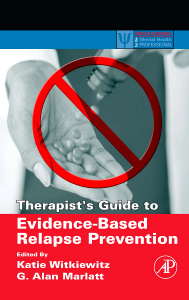Description
Therapist's Guide to Evidence-Based Relapse Prevention
Practical Resources for the Mental Health Professional Series
Coordinators: Witkiewitz Katie A., Marlatt G. Alan
Language: English
Subject for Therapist's Guide to Evidence-Based Relapse Prevention:
400 p. · 15x22.8 cm · Paperback
Description
/li>Contents
/li>Readership
/li>Biography
/li>Comment
/li>
Describes the evidence-based approaches to preventing relapse of major mental and substance-related disorders. Therapist's Guide to Evidence-based Relapse Prevention combines the theoretical rationale, empirical data, and the practical "how-to" for intervention programs.
The first section will serve to describe the cognitive-behavioral model of relapse and provide a general introduction to relapse prevention techniques. While Section II will focus on specific problem areas, Section III will focus on diverse populations and treatment settings.
Instructions for online access
Contributors
Preface
Section I: Introduction and Overview
Chapter 1: Overview of Relapse Prevention
Chapter 2: High-Risk Situations
Section II: Application of Relapse Prevention to Specific Problem Areas
Chapter 3: Relapse Prevention
Chapter 4: Mindfulness-Based Cognitive Therapy as a Relapse Prevention Approach to Depression
Chapter 5: Relapse Prevention for Return of Pathological Worry in CBT-Treated GAD
Chapter 6: Relapse Prevention for Schizophrenia
Chapter 7: Seeking Safety
Chapter 8: Relapse Prevention for Eating Disorders
Chapter 9: Stopping Self-Harm Once and for All
Chapter 10: Treatment of Sexual Offenders
Section III: Specific Populations and Treatment Settings
Chapter 11: Focus on Families
Chapter 12: Relapse Prevention with Hispanic and Other Racial/Ethnic Populations
Chapter 13: Relapse Prevention for Adolescent Substance Abuse
Chapter 14: Relapse Prevention with Older Adults
Chapter 15: Utilizing Relapse Prevention with Offender Populations
Chapter 16: Drinking as an Epidemic—A Simple Mathematical Model with Recovery and Relapse
Index
- Incorporates theoretical and empirical support
- Provides step-by-step strategies for implementing relapse prevention techniques
- Includes case studies that describe application of relapse prevention techniques
These books may interest you

Psychosocial Treatments 214.69 €



